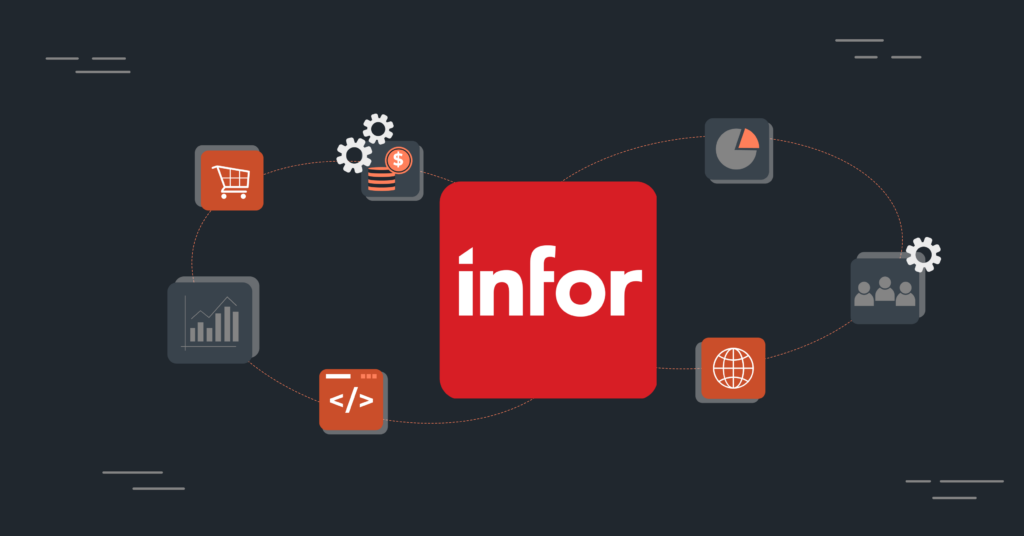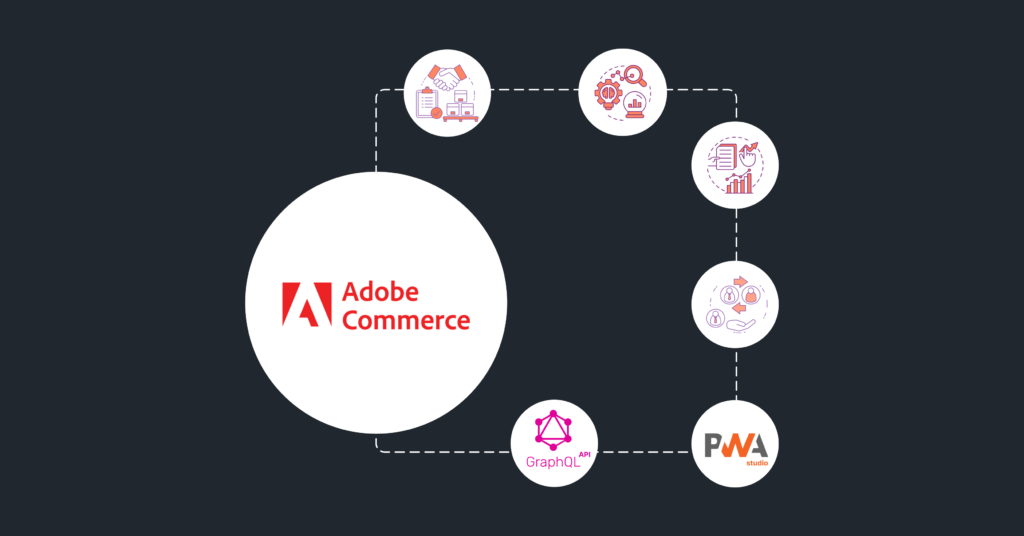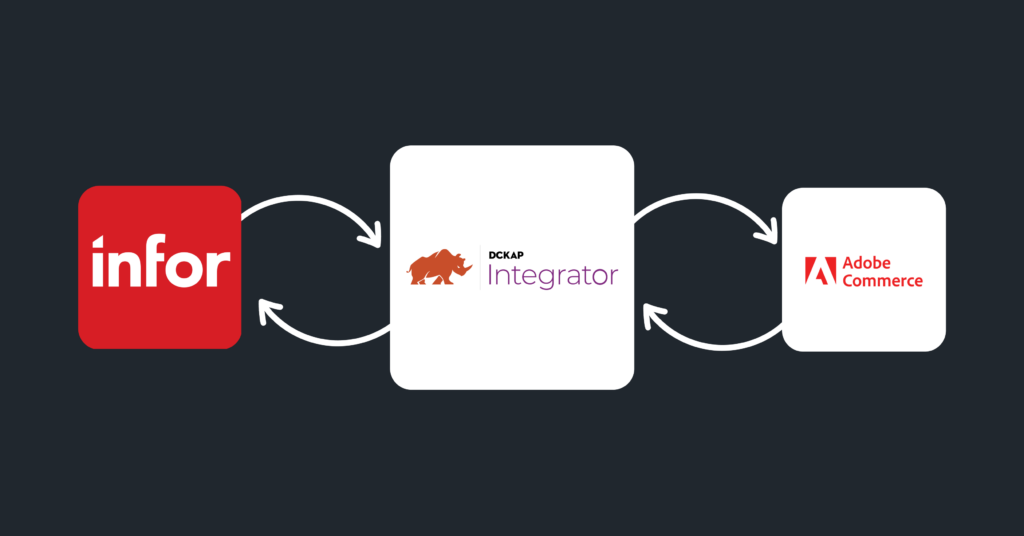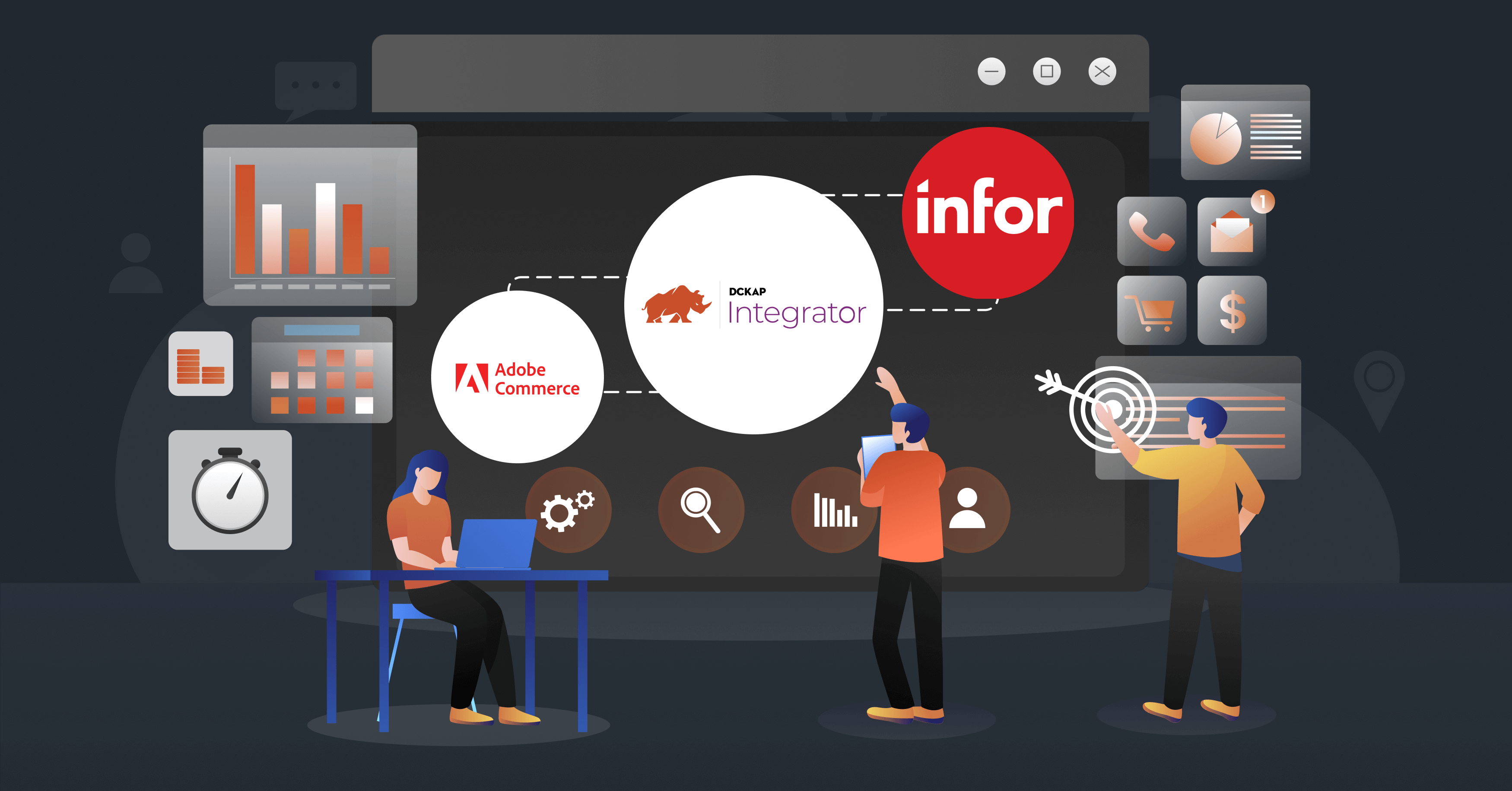Keeping your business as dynamic and evolving as possible is key to its success, especially in the digital world. As you continue to grow, it’s also important to make sure that you’re able to keep track of any changes in data so that you can use this information again at a later date. How you go about doing this will largely depend on the type of business you have and what software solutions are currently being used. There are many ways to do this but Infor and Adobe Commerce Integration is one of the best ways for businesses to keep growing and keep track of growth simultaneously. Read on to discover more about integrating these two systems, see examples of when it would be beneficial, and get some recommendations for which services work well together.
Contents
What is Infor ERP?

Infor ERP is a robust suite of enterprise resource planning (ERP) applications and features designed for growing sales and manufacturing companies to perform their core business operations. The Infor system offers a comprehensive suite of industry modules focused on the manufacturing, service, and distribution industries.
Infor is the world’s third largest provider of ERP solutions. The Core Offering is Infor’s Cloud Suite. Each Cloud Suite provides a unique feature set for every business operation. These integrated capabilities provide visibility across your organization, from accounting and HR to procurement, projects, customer relationship management (CRM), and supply chains.
Moreover, It allows businesses to create and manage campaigns, track performance, and stay organized across teams. It has a strong focus on collaboration, allowing businesses to work together and stay on the same page. It is a great solution for any business that is looking to bring more leads and customers through the door, and it is built so that marketing teams and marketers will be able to use it easily. It can be used to manage social media marketing and advertising, email marketing campaigns, and other marketing efforts. There is a focus on sales and marketing alignment, so it’s a powerful solution that businesses can use to track data across teams.
The Infor ERP System provides several core modules and solutions that can be run from the integrated dashboards of different departments of the enterprise. This means that all business activities are covered overall.
Some of the core modules of the Infor ERP system are:
- Financial management
- Customer management
- Project billing
- Manufacture
- Payroll Extension
Read More: Comprehensive Guide To Understand Infor ERP
What is Adobe Commerce Cloud (Previously Magento)?
Adobe Commerce Cloud is a fully managed cloud-based version of Magento. It integrates well with other Adobe tools. This makes it easy to connect your Adobe Commerce Cloud store to Analytics, Marketing, and Advertising Cloud using best-in-class features from Adobe’s core products. This feature-rich Adobe Commerce platform is built for the e-commerce business looking to expand its reach and deliver an unforgettable omni-channel customer journey.
Built with B2B buyers in mind, Adobe Commerce’s built-in B2B capabilities allow customers to manage their business accounts themselves.
Experiences tailored to Adobe Commerce include customer-centric catalogs, customized pricing, customer-centric content and promotions. With the B2B self-service feature, you can manage your company’s accounts, buyer roles and permissions, workflow approvals, customer credits, order and quote tracking, and account history.
Recommended Reading: Adobe Commerce ERP Integration-Seamless Integration Every Time With DCKAP Integrator

When to Integrate Adobe Commerce (Previously Magento) and Infor?
As was mentioned, it is important to keep track of data across your business, particularly when it comes to marketing and sales. This is true for all businesses, regardless of industry. However, some industries will be more reliant on this data than others. For example, eCommerce businesses are heavily reliant on data in order to grow and keep track of customer trends and purchases. A solution like Adobe Commerce (Previously Magento can be incredibly useful because it allows you to store data related to sales and products. A solution like InfoR can help you to track data that is related to marketing efforts, including customer data like contact information, lead information, and more. When these two systems are integrated, you can take advantage of the benefits of both. This can help you to keep track of data across teams and make it easier to use and understand when you need it.
How can Infor and Adobe Commerce Integration help you be more efficient and productive?
It’s no secret that Infor ERP is one of the most popular enterprise resource planning (ERP) systems on the market. And for good reason – it’s feature-rich, user-friendly, and highly customizable.
Infor and Adobe Commerce Integration further increases efficiency and productivity. Here’s how:
1. Automate data entry and synchronization – One of the biggest advantages of integrating Infor ERP with Adobe Commerce is the ability to automate data entry and synchronization between the two systems. This means less manual data entry, and less room for error.
2. Streamline order management – Another big advantage is the ability to streamline order management. With Infor ERP and Adobe Commerce integrated, businesses can manage all their orders in one place – from start to finish. This not only saves time, but also reduces the risk of errors and missed deadlines.
3. Increase visibility and control – When Infor ERP and Adobe Commerce are integrated, businesses have increased visibility and control over their operations. From a single interface, businesses can view real-time data on inventory levels, sales figures, customer information, and more. This allows businesses to make more informed decisions about their operations and better manage their resources.
4. Improve customer service – Finally, Infor and Adobe Commerce Integration can also help businesses improve their customer service. With all customer information stored in one place, businesses can provide faster and more accurate responses to customer inquiries. And with automated order processing, businesses can reduce shipping times and make it easier for customers to track their orders. Integrating Infor ERP with Adobe Commerce can have a significant impact on a business’s efficiency and productivity. By automating data entry and synchronization, streamlining order management, increasing visibility and control, and improving customer service, businesses can save time and resources while improving their bottom line.
Similar Reading: Using Infor API To Unlock Profitability Through Integration
How to Kickstart Infor and Adobe Commerce Integration?
If you’re looking to increase your efficiency and productivity, there’s no better way to do it than by Infor and Adobe Commerce Integration. By bringing these two powerful platforms together, you’ll be able to take full advantage of their features and capabilities, and streamline your operations like never before.
So how do you go about Infor and Adobe Commerce Integration? Here are a few tips:
1. Use a data integration tool
There are a number of different data integration tools on the market, but we recommend using one that’s specifically designed for Infor ERP and Adobe Commerce. This will make the process much easier and ensure that all of your data is transferred over accurately.
2. Define your workflow
Before you start the integration process, it’s important to take a step back and define your overall workflow. This will help you determine which data needs to be transferred between Infor ERP and Adobe Commerce, and how best to do it.
3. Set up a test environment
Once you’ve determined your workflow, it’s time to set up a test environment. This will allow you to experiment with the integration process without affecting your live data.
4. Perform the actual integration
Now it’s time to actually perform the integration. Depending on the data integration tool you’re using, this process will vary slightly. But in general, you’ll need to connect Infor ERP and Adobe Commerce, map out your data, and then transfer it over.
5. Test, test, test!
Once the integration is complete, it’s critical that you test everything thoroughly. This will ensure that everything is working as it should and that there are no errors in your data.
DCKAP Integrator: You Perfect Integration Solution

If you are looking for a perfect integration solution that can harness the power of data in your systems, you have come to the right place. DCKAP Integrator helps you sync your eCommerce and ERP. Here are the essential use cases that DCKAP Integrator helps you integrate in seconds.
Customer Data Sync
Integrating ERP and E-Commerce systems allows you to synchronize customer information across both platforms. For instance, if a consumer modifies their delivery address on your e-commerce platform, your ERP system will also reflect that change. The order information will now be updated automatically in your ERP system whenever a customer puts an order on your e-commerce website.
Product Data Sync
Your eCommerce store needs to source products from different suppliers. You need to keep track of what stock you have in your warehouse and what stock you need to buy. If you don’t have enough stock then you won’t be able to fulfill orders. Your ERP system should also be integrated with your ecommerce platform so that you can synchronize your stock levels across both platforms. This ensures that your e-commerce store is always stocked and ready to go when customers place orders.
Sales Order Data Sync
If your ERP system and e-commerce system are not connected, you must manually move orders from the former to the latter for fulfilment. The only option you have is to add more resources to sync data between the two systems as the quantity of orders increases in order to guarantee speedy turnaround times. This creates an unnecessary delay where your organization is always constrained by the quantity of orders you can sync across the platforms.
eCommerce and ERP integrations are important because they allow companies to scale, reach new markets, minimize order aging, improve customer satisfaction, and reduce errors and costs. E-commerce and ERP solutions work together to ensure that orders are accepted in the online store and fulfilled in the enterprise resource planning (ERP) system. Synchronizing orders allows companies to grow and expand to new markets, and also helps them avoid order aging, improve customer service, and lower costs.
Pricing Data Sync
A consumer puts an order after visiting your online store. After that, the order data is moved from the e-commerce system to the ERP system for fulfillment. eCommerce and enterprise resource planning (ERP) address this by setting various tier and volume pricing reductions and linking a price with those. As a result of the order being placed at a price determined by the appropriate pricing rule. If your ERP system and eCommerce is not integrated, there will be inconsistency in the pricing, which may result in customer dissatisfaction.
Shipping/Delivery
You might be providing the best product in the best condition at the best possible price, but your customer won’t appreciate it if there is delay in real-time information and delivery. By immediately synchronizing the order status and delivery tracking number from the ERP to the e-commerce system, the connection in this case may quickly close the information gap while keeping the client informed. The synchronization of shipping information will enhance customer satisfaction and experience, expedite customer support, boost internal resource productivity, and more.
Invoice and Payments
Consistency in the accounting books is ensured by synchronizing invoices and payments. The manual sync process is prone to mistakes. Imagine what would happen to your business if the payment information was put improperly into the ERP database during the manual data transfer between e-commerce and ERP. This will cause an error not just in the accounting table but also in the invoice that is generated and the payment that is recorded. Furthermore, the invoice has to be synchronized back into e-commerce in order to collect the payment because the payment was already recorded there. This process has to be automated because doing it all manually is not very effective.

Relevant Reading: Top 5 Ways DCKAP Integrator Eases Your Oracle ERP Integration Journey
Infor and Adobe Commerce Integration Success Story
Dynatronics, headquartered in the broader Salt Lake City, Utah area, is a medical device company committed to providing quality rehabilitative products designed to accelerate the attainment of optimal health. .
Dynatronics runs its eCommerce business on Magento 2 and uses Infor ERP to manage its backend operations. They wanted to integrate both their ERP and e-commerce systems and leverage data for visibility into all operations.
In addition, Dynatronics wanted to better understand and have a 360-degree view of service-specific operations with real-time data, which can only be achieved by synchronizing data between use cases. With the help of the DCKAP Integrator, Dynatronics was able to harness the power of data to make decisions, quickly resolve customer queries, and improve sales.
- DCKAP Integrator Connector has integrated key data points to ensure faster data flow between e-commerce and ERP, every time.
- The data, when imported into Magento or Infor, is powered by DCKAP Integrator with instant data migration, so there’s no missing beat. All data can be checked and evaluated anytime, anywhere. Customer data has been identified with two-way data synchronization (ie) from both Infor and Magento
- This way all details or additions to existing customers, regardless of whether this occurs published anywhere, are updated in both the ERP and front-end e-commerce magazine.
- In addition, dynamic price synchronization has been enabled to get customer-based product prices. All of the above synchronizations that DCKAP Integrator has integrated are done automatically, so Dynatronics staff can save a lot of time and effort, if not having to export and import all both data manually.
Read the complete Case Study here
Ensure Hassle-Free Infor and Adobe Commerce Integration Integration with DCKAP Integrator
Companies of all kinds and sizes can benefit from Infor and Adobe Commerce Integration. This allows you to use both systems to their full potential and gives you access to more data throughout your business. This can help you to keep track of customer data and trends, understand your sales better, and make better decisions based on this information. There is no doubt that businesses that are able to successfully ensure Infor and Adobe Commerce Integration will benefit greatly from doing so. Not only does it allow you to keep track of important data, but it also makes it easier to use and understand when you need it.
Want to know more about Infor and Adobe Commerce Integration? Book a demo now.




